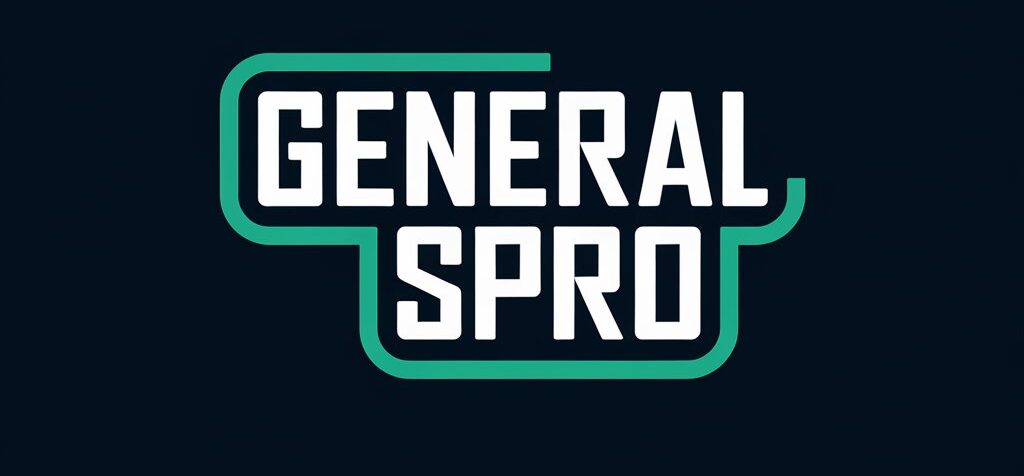Phone scams are on the rise, troubling people across the USA as scammers develop increasingly sophisticated tactics. Among recent suspicious numbers, 209-379-4351 stands out, raising questions about its legitimacy. Is this number simply a telemarketing call, or could it be a scam? In this article, we’ll cover the details of 209-379-4351, the signs of a phone scam, ways to protect yourself, and actions to take if you encounter suspicious activity.
Investigating the Phone Number: 209-379-4351
Let’s start with a closer look at 209-379-4351. Numerous reports indicate that this number could be involved in fraudulent calls. People describe various scam tactics associated with this number, such as impersonating companies or using urgency to pressure individuals. Here’s a breakdown of typical methods scammers might use:
- Changing the caller ID name to look local or familiar.
- “Spoofing” techniques to make the call appear legitimate.
- High-pressure tactics to create urgency.
Understanding these tactics can help you identify scam calls and respond safely.
Understanding Phone Scams
Scammers today use a range of approaches to deceive their targets, often by posing as reputable businesses or government agencies. Common types of scams include:
- Telemarketing Fraud: Callers might claim they’re selling products or services but are attempting to steal Money or personal information.
- Tech Support Scams: Callers impersonate tech support from well-known companies, alleging an urgent issue with your device.
- Impersonation Scams involve scammers posing as banks, government agencies, or law enforcement to pressure victims into sharing sensitive information.
Key Signs of a Phone Scam
Knowing the signs of a scam can prevent you from falling victim. Here are a few indicators:
- Demands for Immediate Payment: Scammers often request immediate payments through unusual methods like gift cards or wire transfers.
- Threats or Aggressive Language: Calls with threats or scare tactics often indicate fraud.
- Unknown or Suspicious Caller ID: Be cautious if you don’t recognize the number.
- Too-Good-to-Be-True Offers: Unsolicited calls offering prizes or Money are frequently scams.
These red flags can help you recognize scams and protect your personal information from fraud.
How to Respond to Suspicious Calls
If you receive a suspicious call, here’s how to respond:
- Avoid Sharing Personal Information: Don’t disclose personal details to unknown callers.
- Hang Up if You’re Uncomfortable: Ending the call immediately is often the safest choice.
- Enable Call Screening: Many phones have features to filter out suspicious calls, helping you avoid scams.
Responding carefully to unknown calls can safeguard your information and prevent potential scams.
Understanding 209-379-4351: Is It a Scam?
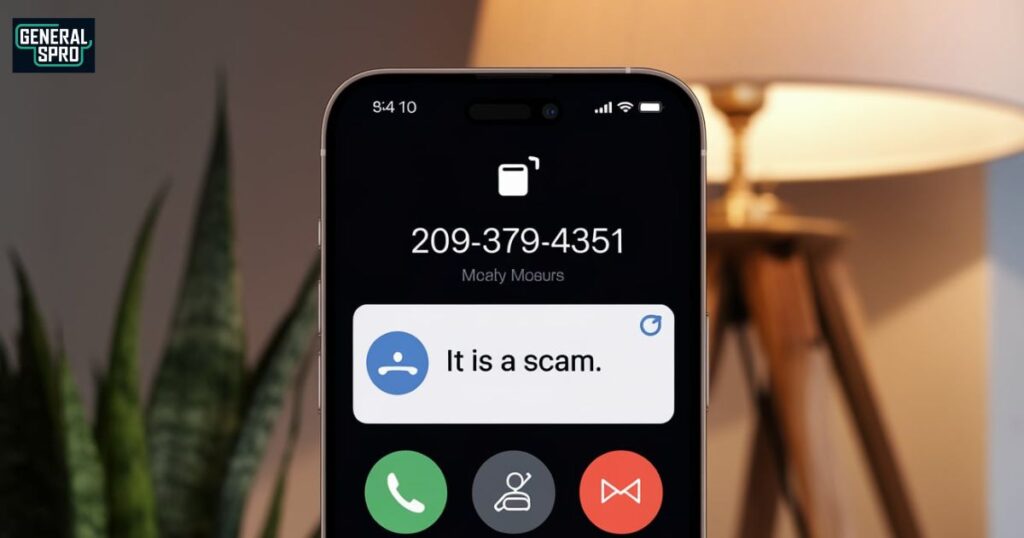
According to user reports, 209-379-4351 exhibits several characteristics typical of scam numbers. The call content often includes requests for personal data, urgent language, and impersonation tactics.
Since scammers can use “spoofing” to disguise the true origin of a call, it’s challenging to track down the caller’s identity. When in doubt, avoid engaging with unknown numbers and prioritize your safety.
Red Flags Indicating a Scam
Calls from numbers like 209-379-4351 might raise alarms. Watch out for these common red flags:
- Multiple Calls in a Short Timeframe: Scam calls often come repeatedly to create urgency.
- Caller Refuses to Verify Identity: Scammers may avoid direct questions about their identity.
- Immediate Requests for Personal Data or Payments: Be wary if the caller demands personal information immediately.
Spotting these warning signs can help you avoid falling victim to a phone scam.
What Users Are Saying About 209-379-4351
Online forums and reverse phone lookup sites contain user reviews and warnings about numbers like 209-379-4351. People often report similar patterns with this number: repetitive calling, payment requests, or officials’ impersonation. These reports can offer valuable insights and help others avoid similar situations.
Steps to Take if You Receive a Call from 209-379-4351
If you receive a call from this number or any other suspicious caller, take these precautions:
- Document the Call: Make a note of the caller’s details and the content of the conversation.
- Block the Number: Most phones offer options to block specific numbers to avoid further harassment.
- Report the Incident: Report suspicious numbers to relevant authorities or online phone directories to warn others.
Taking proactive measures is the best way to deal with scam calls.
Recognizing Common Signs of a Scam: Is 209-379-4351 Legitimate?
It’s important to note that specific patterns can reveal a scam. You may deal with fraud if you feel pressured to act quickly or the caller requests confidential information. Always approach unknown numbers cautiously and verify identities if you need clarification.
Understanding the Rise of Phone Scams and the Case of 209-379-4351
Phone scams are an increasing threat, with new numbers like 209-379-4351 surfacing regularly. The growth of digital communication has created more opportunities for scammers, making it essential for individuals to stay informed about new scam tactics.
The Increasing Threat of Scam Calls
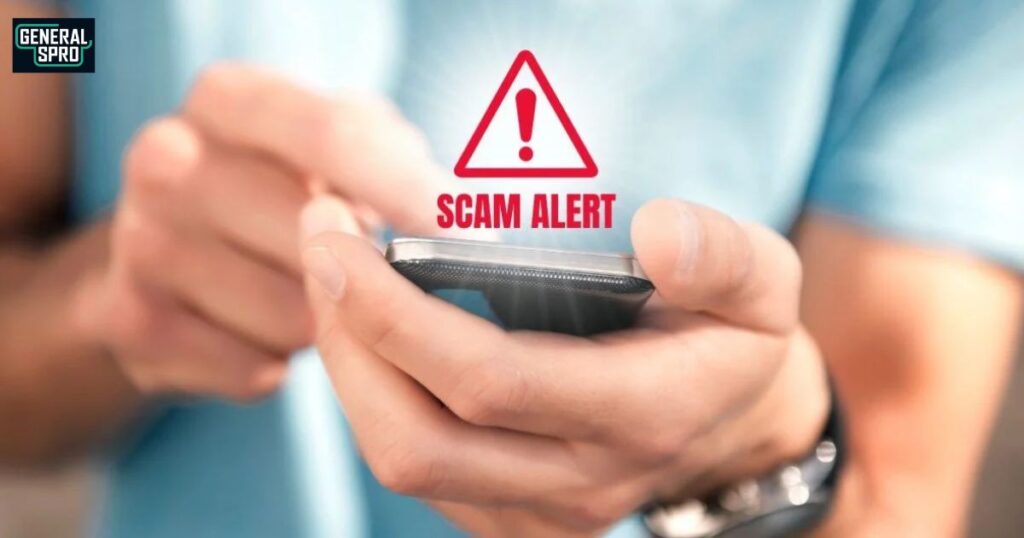
With the rise in technology, scams have become more accessible to conduct and more challenging to identify. Spoofing and voice-altering technology make it difficult to trace calls, adding to the challenge.
What We Know About 209-379-4351
User reports suggest that 209-379-4351 may be associated with scam activity. Following best practices when receiving unknown calls is crucial for your safety.
How to Protect Yourself
Here are ways to stay protected against scam calls:
- Utilize Call Blocking Apps: These apps can help filter suspicious numbers and prevent unwanted calls.
- Register with the Do Not Call Registry: This service blocks legitimate telemarketing calls, making scam calls easier to spot.
- Educate Yourself About Common Scams: The more familiar you are with scam tactics, the easier they are to recognize.
- Verify Caller’s Identity: Be bold, ask questions, and verify the caller’s identity.
Is 209-379-4351 a Scam?
Based on user experiences and known scam tactics, 209-379-4351 could be a scam number. However, since scammers can often change numbers, it’s best to practice caution when answering any unfamiliar call.
Understanding the Risks of Answering Unknown Calls
Receiving a call from an unknown number can feel unsettling. When you answer, scammers might attempt to gain your trust through friendly conversation, use scare tactics, or even record your voice for fraud. Knowing the risks can help you decide whether to pick up or ignore unknown calls, especially if they repeatedly contact you.
Why Phone Scams Are Becoming More Prevalent
In recent years, phone scams have surged in number. Scammers benefit from technology like number spoofing, which disguises the caller’s true identity. The growth of mobile technology and the ease of online anonymity have made it easier for fraudsters to reach more people, increasing the chance of success.
How Number Spoofing Works in Scam Calls
Number spoofing allows scammers to change their displayed caller ID to resemble a trusted organization or a local number. Using this technology, scammers trick people into answering, thinking the call is from someone familiar. This deceptive tactic makes scam calls more convincing and more complicated to recognize.
What is a Reverse Phone Lookup, and How Does It Work?
A reverse phone lookup service lets you search for information about unknown numbers. You may find caller identities, past reports, and scam links by entering the number in an online database. This is a helpful first step to verify if a suspicious number has been reported by other people.
Recognizing the Psychological Tactics Used in Phone Scams
Phone scammers are skilled manipulators who use psychological tactics to pressure or persuade their targets. They may play on fear, urgency, greed, or sympathy to elicit a quick response. Recognizing these tactics can help you maintain composure and avoid falling for scams.
What to Do if You’ve Fallen for a Phone Scam
If you’ve fallen for a scam, the first step is to contact your bank or credit card provider to report potential fraud. You should also file a report with the Federal Trade Commission (FTC) and alert local law enforcement. Taking action quickly can help prevent further losses and protect your identity.
How Scammers Use Voicemail Messages to Lure Victims
Scammers may leave voicemails claiming to be from reputable companies, asking you to call back urgently. These messages often include a fake “case number” to appear credible. Avoid returning calls to unknown numbers; instead, reach out directly to the organization’s official contact number.
What to Do if You Receive Harassing Calls from Unknown Numbers
Harassing calls can be stressful and intrusive. If you receive repeated unwanted calls, document each instance and consider blocking the number. In severe cases, report the issue to local authorities and phone service providers to potentially trace the caller.
How to Use Call Screening to Filter Unknown Numbers
Call screening features available on smartphones can help block or filter unknown numbers. These services identify calls as spam or telemarketing based on previous user reports and block them automatically. This is an effective way to limit interactions with suspicious callers.
Understanding the Difference Between Telemarketing and Phone Scams
While telemarketing involves legitimate businesses contacting potential customers, scammers often disguise themselves as telemarketers to steal information. Recognizing the difference between genuine telemarketing and scams can protect you from inadvertently giving information to fraudsters.
Common Traits of Scam Phone Numbers Like 209-379-4351
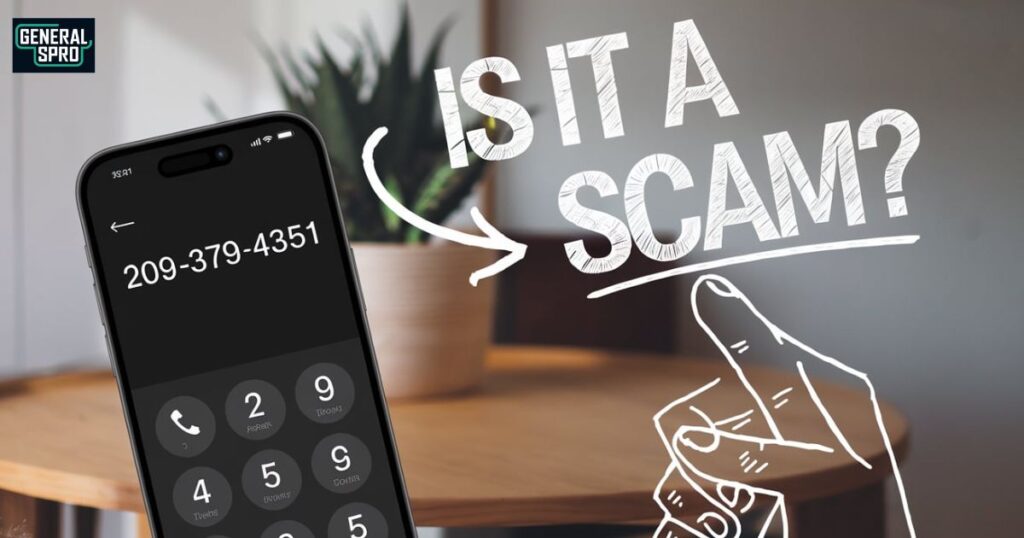
Suspicious numbers like 209-379-4351 often share similar traits, including multiple fraud reports, high-frequency calling, and an inability to verify the caller’s identity. Learning to identify these common signs can help you spot scam numbers quickly.
Signs of High-Risk Numbers That May Indicate Scams
High-risk numbers often belong to scammers. These numbers may change frequently and attempt repeated contact. Users should be cautious if they receive multiple calls from such numbers, especially if they come with unusual area codes or need to leave a clear voicemail.
What to Look For in Legitimate Caller IDs vs. Scammers
A genuine caller ID often matches the company or person you’re expecting. Scammers, however, often use generic names, like “Customer Service” or “Important Call,” and sometimes even your area code to trick you into answering. Knowing what a legitimate caller ID looks like can help you avoid scams.
Why Scammers Often Target Senior Citizens
Seniors are often the primary targets of phone scams due to potential vulnerabilities, like unfamiliarity with digital security practices or more trust in authority figures. Educating older relatives about common scams can help protect them from fraudulent calls.
Understanding the ‘Do Not Call’ Registry and Its Benefits
The National Do Not Call Registry is a free service allowing you to opt out of telemarketing calls. Though it doesn’t stop scam calls entirely, it can help reduce legitimate marketing calls, making it easier to recognize and avoid scams.
How to Report a Scam Phone Number Like 209-379-4351
If you suspect a number is part of a scam, report it to the FTC and your phone provider. Many online communities and phone lookup services also allow users to share their experiences, which can alert others and deter scammers from targeting more people.
Exploring the Most Common Types of Phone Scams in the USA
Phone scams vary widely, from IRS impersonations to fake tech support. Knowing the common types of phone scams can help you recognize these schemes. Scammers often use trusted institutions or popular companies to trick victims into compliance.
Why Blocking Unwanted Numbers May Not Be Enough
Blocking a single scam number can help reduce calls temporarily, but scammers often use multiple numbers. For comprehensive protection, consider using third-party call-blocking apps or enabling carrier-level protections to manage unwanted calls more effectively.
Is Your Phone Safe? How to Secure Your Device Against Scams
Protecting your device from scams requires more than just call screening. Consider using strong passwords, avoiding unsecured networks, and installing antivirus software to secure your personal data and prevent unauthorized access.
The Importance of Caller Verification for Business Calls
Scammers frequently impersonate business professionals to gain trust, especially in finance or healthcare. Verifying the caller’s identity through a secondary method, like checking the company website for contact information, ensures that you speak with a legitimate representative.
Avoiding Fraudulent Charity Calls and Donation Requests
Fake charity scams are common, especially after disasters or during holidays. Always verify the organisation’s legitimacy by visiting its official website or using trusted charity verification services like Charity Navigator.
How Phone Scammers Exploit Technology to Reach Victims
Phone scammers use tools like automated dialers, spoofing software, and even artificial intelligence to deceive victims. Understanding these technologies can help you recognize scam calls, even when they appear sophisticated or highly personalized.
The Role of Law Enforcement in Combating Phone Scams
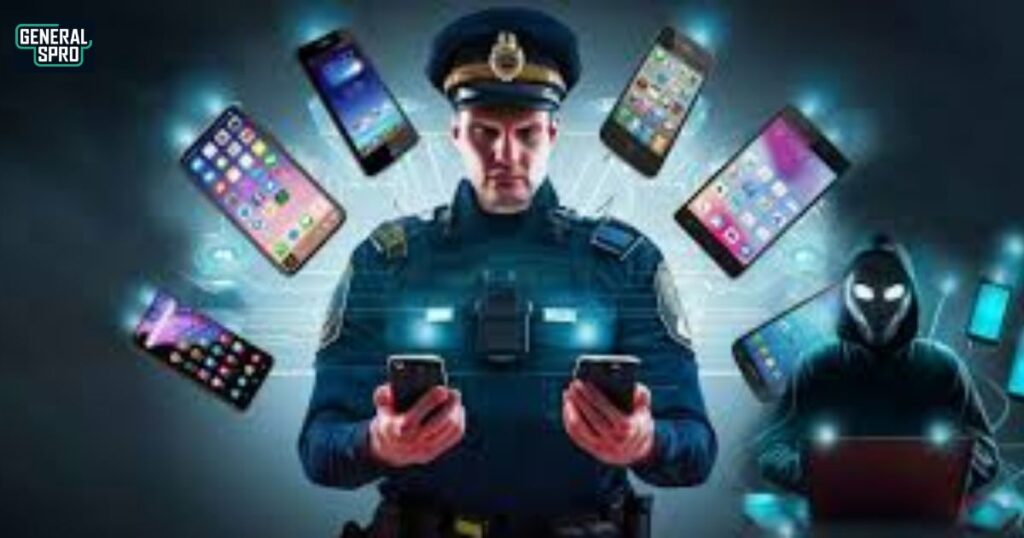
Law enforcement agencies work to track, investigate and shut down large-scale phone scams. Reporting suspicious activity, such as calls from 209-379-4351, helps these agencies collect data and potentially prevent future scams.
Tips for Helping Family Members Avoid Phone Scams
Teaching family members about common scams and how to avoid them can protect your loved ones from phone fraud. Share practical tips, like verifying caller identity, and explain how to respond to suspicious calls.
What Are the Financial Implications of Falling for a Phone Scam?
Falling for a phone scam can lead to significant financial losses, identity theft, and credit issues. Scammers may drain accounts, open lines of credit, or make fraudulent purchases, leaving victims with lasting damage.
Recognizing Patterns in Scam Calls to Protect Yourself
Scam calls often follow patterns, such as repeated calls from similar numbers, urgency, or requests for payment through unconventional methods. Recognizing these patterns can help you identify scam attempts and respond cautiously.
How Phone Companies Are Addressing Scam Calls
Telecommunications companies implement SHAKEN/STIR protocols and other authentication measures to reduce scam calls. By verifying caller IDs and identifying spam callers, phone companies are helping consumers avoid fraudulent calls.
The Psychological Impact of Harassment from Scam Calls
Repeated harassment from scam calls can lead to stress and anxiety, particularly for individuals who receive numerous calls each day. If scam calls are causing distress, consider using call-blocking solutions or contacting mental health resources for support.
How to Verify Phone Numbers Before Answering
If an unknown number calls, verify its legitimacy before answering. Use online reverse lookup tools or apps that provide caller information, which can help you make informed decisions about whether to engage.
The Role of Online Communities in Exposing Scam Numbers
Online communities dedicated to scam reports allow users to warn others about specific phone numbers, like 209-379-4351. These platforms provide real-time feedback, enabling individuals to avoid scams and support community awareness.
Why Personal Information Should Never Be Shared Over the Phone
Sharing sensitive information, such as your Social Security number or banking details, can lead to severe consequences. Scammers often impersonate officials to get this information, so only share it if you are 100% sure of the caller’s identity.
Key Facts
- Phone scams are a significant problem, with numbers like 209-379-4351 suspected of fraud.
- Recognizing common scam signs can help prevent victimization.
- Tools like call-blocking apps and the Do Not Call Registry offer protection.
FAQs
1. What is the phone number 209-379-4351, and why does it keep calling me?
209-379-4351 is a number reported by many people as suspicious. Frequent calls from unknown numbers like this could indicate a scam or telemarketing attempt.
2. How can I tell if 209-379-4351 is a scam?
Look for signs like a sense of urgency, requests for personal information, or threats of legal action. Scammers often use these tactics to get a quick response.
3. What should I do if I receive a call from 209-379-4351?
If the caller seems suspicious, don’t share any personal information. Consider blocking and reporting the number to the Federal Trade Commission (FTC) or your phone provider.
4. Why do scammers use local-looking numbers like 209-379-4351?
Scammers use “number spoofing” to make calls appear local, which can increase the likelihood of someone answering.
5. Are there tools to help me identify scam numbers?
You can use reverse phone lookup tools, call-blocking apps, or enable spam protection through your phone carrier to identify scam numbers.
6. Can I block 209-379-4351 permanently?
Most smartphones and phone providers offer blocking options. Once blocked, calls from the number will go directly to voicemail or be restricted from reaching you.
7. How do I report a phone number like 209-379-4351?
You can report suspicious numbers to the FTC or file a complaint with the Do Not Call Registry. This helps authorities track and address scam activity.
8. What are the signs of a phone scam I should watch out for?
Common signs include urgent requests for Money, threats, demands for personal information, or offers that seem too good to be true. Always exercise caution.
Conclusion
Phone scams continue to target people nationwide, and numbers like 209-379-4351 are part of the problem. By recognizing scam warning signs, responding carefully to suspicious calls, and using available tools, you can protect yourself from telemarketing fraud and phone fraud alerts. Stay vigilant, and always verify before trusting unknown callers.

